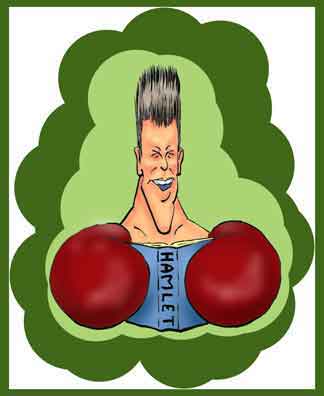
Gene Tunney
Not Down for the Count
Gene Tunney
- "Gene could have gotten up and gone on to win the fight."
- Jack Dempsey
Mention Gene Tunney and any boxing fan immediately thinks of the Long Count. That was the famous fight in Chicago's Soldier Field on September 22, 1927 with Jack Dempsey. It was a bout that no one thought would happen. After all, Jack had already lost his title of World Heavyweight Champ to Gene on September 23, 1926.
People thought Jack was finished. But then he signed up to fight Jack Sharkey on July 21, 1927. The smart money boys opened 7-5 on Sharkey. Sure enough, Sharkey was winning through the sixth round and some thought Sharkey might even KO Jack.
The still-extant films show that Jack, as was his wont, was hitting Sharkey in the body. But knowing that Jack was a body-puncher, Sharkey had begun the fight with his trunks riding up higher than normal, no doubt hoping that the referee might count what was otherwise a legitimate blow as a foul.
Then shortly after the seventh round started, Jack hit Sharkey at the belt line. Even if Sharkey's trunks were at the normal height this would still have been a legitimate punch (the rule is you don't hit below the belt). But one boxing critic said you can see Sharkey turned to the ref probably to complain that Jack had hit him low. Jack, seeing an opening, landed a left hook to the face and Sharkey went down and was counted out.
Jack wasn't called The Manassa Mauler for nothing. If he scored a knockdown, he would resume his re-pounding immediately after his opponent's knees were up from the canvas. But by the time Jack and Gene had agreed to the re-match there was the new rule. In the event of a knockdown the fighter on his feet had to go to a neutral corner before the referee could begin the count.
The rule, we should point out, did not arise because of Jack's tactics. Instead it was Jack and his managers who asked for the rule and specifically for the re-match with Gene. Gene and his managers were agreeable.
At first Jack had the advantage and was getting the better of Gene. Then Gene, as everyone knows, went down in the 7th round. Jack, forgetting the new rule, stood around for five seconds until the referee got him to go to the neutral corner. Gene got up on the count of nine (ergo, fourteen) and went on to win the fight.
Could Gene have gotten up in time? Well, looking at the film, people seem to see what they want to see. If you think Gene couldn't have gotten up, you'll see him looking dazed and befuddled as he sits on the canvas. But if you think he could have been up at a real count of nine, you see him as alert and point out that since he got up just in time, his mind was clear and alert.

A Famous Talk Show Host
Fifty years later Gene was asked by a famous talk show host if he could have gotten up. Jack, who was also present, interrupted and said yes, Gene could have gotten up and would have gone on to win the fight. Both Jack and Gene lived quite long after their famous fight and well past their retirements. Gene died in 1978 at age 81 and Jack a few years later in 1983, age 87.
Today boxing does not garner the interest it once did. Recently a cable network which had been long broadcasting major bouts announced it would discontinue boxing altogether. And yet as late as the 1990's boxers were mainstream celebrities and historical figures - not just Jack and Gene but other greats like Rocky Marciano, Muhammad Ali, and the one, the only Joe Louis. They were routinely interviewed by famous sportscasters and everyone knew who the world heavyweight champion was. But the next time you're out and about, ask some of your companions if they know who holds the current title. Fat chance.
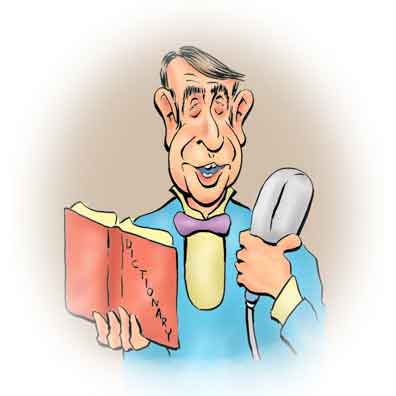
A Famous Sportscaster
What, we ask, has happened?
We should remember that up through the 1940's there were only three professional sports of any note in the United States. These were baseball, horse racing, and yes, boxing. Although baseball was the national pastime and #1, boxing came in a strong #2. As far as basketball, forget it, and for football, it was popular if it was college football.
Opinions as to why boxing has fallen in popularity are legion. Certainly with the advent of television came the onslaught of more sports at the professional level- football and basketball, especially. So simple allotment of the required time would produce a muscling out of boxing.
Nor was boxing seen as sophisticated entertainment drawing the in-crowd to their cable boxes. In response boxing impressarios began to book pay-per-view and closed circuit matches. The private broadcasts may have kept revenues up but they also reduced the audience.
Oddly enough for a sport that is considered by many lowbrow, the action requires a specialist's eye to follow. In other sports, anyone can count the touchdowns, baskets, and runs as easy as the expert. But in boxing the average Joe and Josephine Blow just see two guys dancing around the ring and missing punches. Most of the time the layman can't tell who's winning unless there's a knockout.
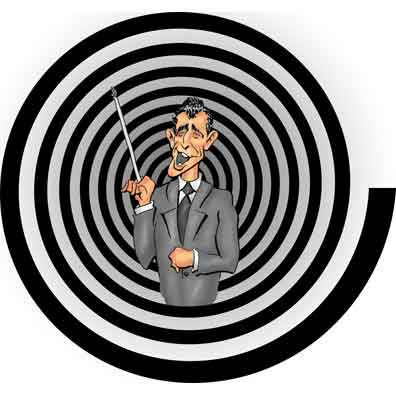
Rod Serling
His prediction didn't shake out.
And that brings us to the point of major controversy. In one of the 1963 episodes of the Twilight Zone, Rod Serling's opening narration of the show titled "Steel" ran:
Sports item circa 1974. Battling Maxo, B2 heavyweight, accompanied by his manager and handler arrives in Maynard, Kansas, for a scheduled six-round bout. Battling Maxo is a robot, or to be exact an android. Definition: an automaton resembling a human being. Only these automatons have been permitted in the ring since prizefighting was legally abolished in 1968.
Obviously Rod's prediction didn't shake out. However, medical organizations have been increasingly calling for the sport's abolition.
Boxing and it's later developments, the critics point out, are the only sports where the actual goal is to deliberately inflict harm on the opponent. Blows to the head are a principle part of a boxer's repertoire, and a perfectly legal, noteworthy, and even praised outcome - the knock-out - is due to physical trauma that can cause permanent brain damage. Use of gloves or helmets has not reduced the severity of the injuries. One critic pointed out the irony that although the rules mandate that punches at what Pliny the Younger called "the parts that are held in reverence" are - ah - out of bounds, the brain has received no similar protection.
Boxing advocates, though, pooh-pooh such objections as the lowing of the base herd of the bleeding heart liberals. They point out that most bouts do not end in a knockout and that skilled boxers win on points and decision. And it remains one profession where the possessor of the skills can achieve riches and fame without being - and usually are not - the progeny of wealth and privilege.
Gene was certainly not your stereotypical bruiser. One of his hobbies was - get this - reading. Not just reading but reading the classics. He was particularly fond of the plays of George Bernard Shaw (and the men became good friends) and - again get this - William Shakespeare. It was common to refer to Gene as The Shakespearean Pugilist.
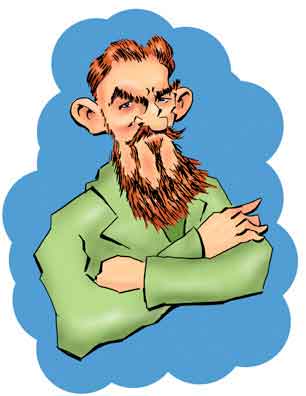
George Bernard Shaw
Literary Boxing Fan
Gene never hid his fondness for books, and after he retired in 1928, he was invited to give a lecture at Yale. Some thought this was a condescending gesture, maybe even a set up. Gene's wife, Polly, was afraid the eggheadential audience would sneer at a mere (ptui) sportsman trying to lecture on the Bard. She needn't have worried. The several hundred Ivy-League students gave Gene an enthusiastic reception.
Oddly enough, sportswriters weren't so sanguine. Even Heywood Broun, who not only had covered sports but was a drama critic as well, seemed sour when he wrote "Harvard, I trust, will counter by asking Babe Ruth to tell the boys in Cambridge just what Milton has meant to him." Even Will Rogers - who had no hesitation in praising Benito Mussolini - was critical of Gene. "Let's have prizefighters with harder wallops," he snorted, "and less Shakespeare."
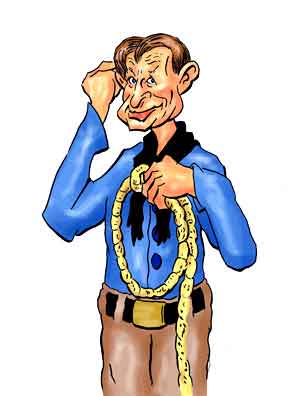
Will Rogers
Critical of Gene
Gene really was a bibliophile and got to know many of the leading authors of the time. He himself ventured into writing and wrote articles for magazines like the Saturday Evening Post, the Reader's Digest, and the Atlantic Monthly. He did the writing himself and even his book - A Man Must Fight - was written without a ghostwriter.
In later years Gene was even referred to as a "Shakespeare Scholar", and he always maintained that his reading was part of his training regimen. The story was that when Jack and Gene were scheduled for their first fight, Jack sent a scout to Gene's camp. The scout returned and told Jack not to worry. Jack was sure to beat Gene.
"I seen the lug reading a book," he said.
References
When Dempsey Fought Tunney: Heroes, Hokum, and Storytelling in the Jazz Age, Bruce Evensen, University of Tennessee Press, 1996.
"Dempsey vs Sharkey: Protect Yourself At All Times: Did Dempsey Hit Sharkey Low?", Bobby Franklin, Boxing Over Broadway, July 20, 2017.
"The Dempsey-Tunney Fight", Michael Hirsley, Chicago Tribune, December 19, 2007.
The Legendary Champions: 1882-1929, The Big Fights Inc., 1968.
"HBO Says It Is Leaving the Boxing Business", Wallace Matthews, The New York Times, September 27, 2018.
"Why Boxing Is Becoming Less Relevent In America", NJM, Bleacher Report, August 29, 2008
The Boxing Kings: When American Heavyweights Ruled the Ring, Paul Beston, Rowman and Littlefield, 2017.
"Steel", The Twilight Zone, Lee Marvin (Actor), Joe Mantell (Actor), Rod Serling (Creator), Don Weis (Director), Richard Matheson (Writer), October 4, 1963, Columbia Broadcasting System.
"A. M. A., Citing Danger, Asks Abolition of Boxing", Robert Trumbull, The New York Times, December 6, 1984.
"Tunney Tells Yale About Shakespeare", The New York Times, April 24, 1928.
Books and Reading in the Lives of Notable Americans: A Biographical Sourcebook, John Anthony McCrossan, Greenwood Publishing Group, 2000.
The Shakesperean Pugilist, Paul Beston, The New York paulbeston.com, April 23, 2017
"The Playwright and the Prizefighter", Jay Tunney, Shaw: The Annual of Bernard Shaw Studies, Vol. 23, pp. 149 - 154, Penn State Press, 2003.
"Vintage College Classes: College Classes That Ring the Bell", Life Magazine, pp. 73-77, November 28, 1969.
Try and Stop Me, Cerf Bennett, Simon and Schuster, 1944.